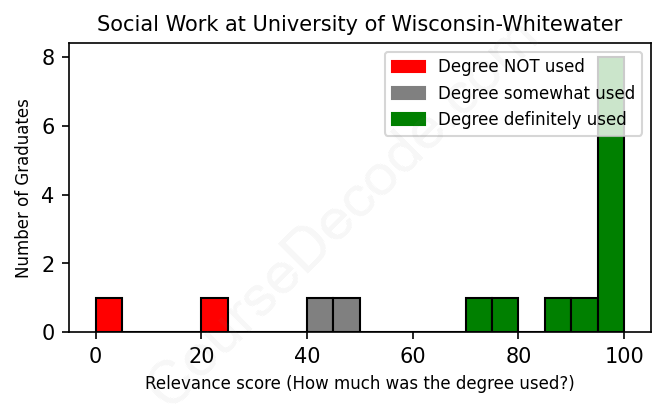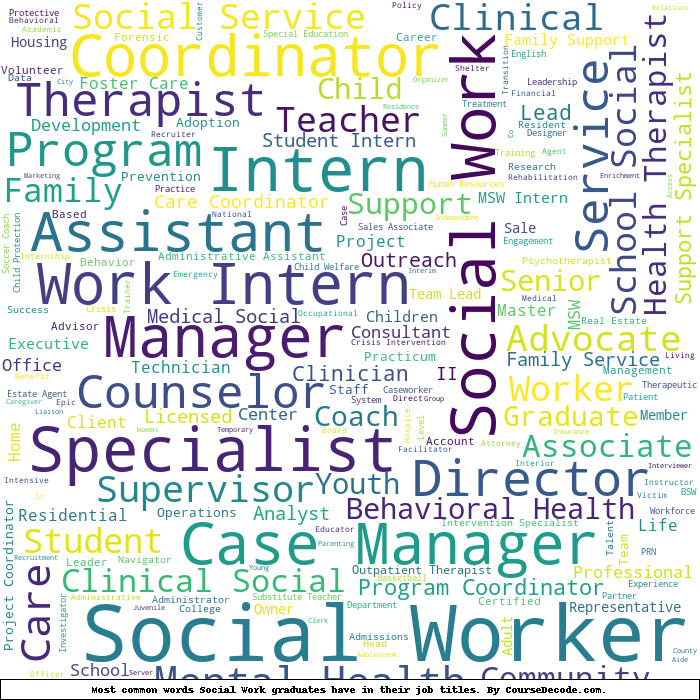
First, some facts. Of the Social Work graduates from University of Wisconsin-Whitewater we've analyzed , here's how many have used (or NOT used) their degree in their career:

These are estimates based on AI analysis of 16 LinkedIn profiles (see below).
The verdict? Above average. Overall, with an average relevance score of 77%, Social Work graduates from University of Wisconsin-Whitewater have a higher likelihood (+10%) of finding work in this field compared to the average graduate across all fields:
And for comparison, here's the chart for all profiles we've looked at across all degrees.
Also, after graduating, 62% of these graduates have pursued further education other than another Bachelor's degree (such as a Masters degree or other), compared to the average across all profiles of 35%. This suggests you may need more than just a Bachelors degree to be competitive as a Social Work graduate.
See the details:
|
Relevance score: 100% We think this person has gone into a career highly relevant to their degree. We think this person has gone into a career highly relevant to their degree.
DEGREE INFOGraduated in 2019 from University of Wisconsin-Whitewater with a Bachelor of Science - BS in Social Work. Also pursued further education since (see below). JOB HISTORY SINCE GRADUATIONInternship Children's Hospital of Wisconsin May 2019 - Aug 2019 Intern  S.C. Johnson Elementary Sep 2019 - Apr 2020 School Social Worker  Gilmore Fine Arts and North Park Elementary Aug 2020 - Jun 2021 School Social Worker  Jerstad-Agerholm Middle School Aug 2021 - Present FURTHER DEGREES DONE SINCE GRADUATINGMaster of Social Work - MSWUniversity of Wisconsin-Milwaukee 2019 - 2020 ABOUTI am currently a middle school social worker at Jerstad-Agerholm. I received my masters in school social work from the University of Wisconsin - Milwaukee. During this time, I have gained knowledge in the social work field. I have been able to enhance my skills in interacting with children and their parents, collaborating with my co-workers, and interacting with the community. |
The top 10 most common jobs done by the graduates we've analyzed (ranked most common to least) are:
Looking at the job histories of University of Wisconsin-Whitewater graduates with a degree in Social Work, it's clear that many of them have pursued roles that are strongly aligned with the principles and practices of social work. Common positions include case managers, social workers, youth counselors, and various roles in mental health services where they provide direct support and advocacy for individuals and families in need. These jobs typically involve applying the skills they gained during their studies, like client assessment, resource coordination, and therapeutic practices, which are essential in addressing social issues. For example, roles like Youth Care Worker, Service Coordinator, and Behavioral Health Clinician all demonstrate relevant application of their educational foundation in real-world settings.
However, it’s also noticeable that some graduates have ventured into positions that are less directly related to social work. For instance, roles such as bartending or administrative positions often lack the alignment with social work principles. While these jobs may develop transferrable skills like communication and organization, they don't utilize the specific social work knowledge that students acquire. Overall, the majority of positions taken by these graduates are quite relevant to their degree, affirming that their education prepared them well for careers focused on helping others, despite the few exceptions that stray into unrelated fields.
Here is a visual representation of the most common words in job titles for Social Work graduates (this is across all Social Work graduates we've analyzed, not just those who went to University of Wisconsin-Whitewater):

Graduates of the Social Work program at University of Wisconsin-Whitewater seem to have diverse career trajectories with a predominant trend towards roles that are closely aligned with social services and community support. Right after graduating, many of them start in positions like case managers, youth care workers, or support specialists. For instance, we see folks entering roles as supervised visitation workers or service coordinators within a year or two after graduation, which indicates that many are landing jobs directly related to their field of study and likely utilizing their practical internships experienced during their education. This initial phase highlights a solid grounding in social work principles as graduates jump right into meaningful work helping individuals and families in need.
As they progress in their careers, around five to ten years post-graduation, many continue to climb the career ladder within social services. They often take on more specialized roles, such as licensed social workers, regional directors, or psychotherapists. Some have moved into leadership positions or shifted towards focused areas like behavioral health or educational support, like school social workers. While there are instances of individuals veering off into unrelated fields, such as bookkeeping or bartending, the majority seem committed to social work or adjacent sectors. Overall, it looks like many graduates from this program are finding success in careers directly relevant to social work, indicative of a strong foundation provided by their education at UW-Whitewater.
Alright, so getting a Bachelor's degree in Social Work at the University of Wisconsin-Whitewater can be a pretty solid mix of challenging and rewarding. It's not necessarily the easiest degree out there, but it's definitely manageable if you're motivated and passionate about helping people. You'll dive into subjects like human behavior, community development, and social justice, which can get pretty deep and require some real critical thinking. Plus, there are field placements where you get hands-on experience, and that can be tough but super valuable. So, while it might be a bit more intense than some other majors, if you've got a genuine interest in social issues and helping others, you might find it more enjoyable than daunting!
Most commonly, in the LinkedIn profiles we've looked at, it takes people 4 years to finish a Bachelor degree in Social Work.
Looking at the job paths of these Social Work grads from University of Wisconsin-Whitewater, it seems like most of them are earning decent money, especially as they move up in their careers. The first graduate, for instance, went from entry-level positions to a Regional Director role, which likely pays pretty well. Other graduates have also taken on roles like behavioral health clinician and school social worker that typically offer solid pay. However, it's worth noting that social work jobs can vary widely in salary, especially early on; some entry-level positions like case managers or interns might not bring in a ton of cash. Overall, though, as they gain experience and take on more responsibilities, their salaries seem to improve, making it look like they're doing alright financially!
Here is a visual representation of the most common words seen in the "about" section of LinkedIn profiles who have a Bachelor degree in Social Work (this is across all Social Work graduates we've analyzed, not just those who went to University of Wisconsin-Whitewater). This may or may not be useful:

Here are all colleges offering a Bachelor degree in Social Work (ordered by the average relevance score of their Social Work graduates, best to worst) where we have analyzed at least 10 of their graduates: